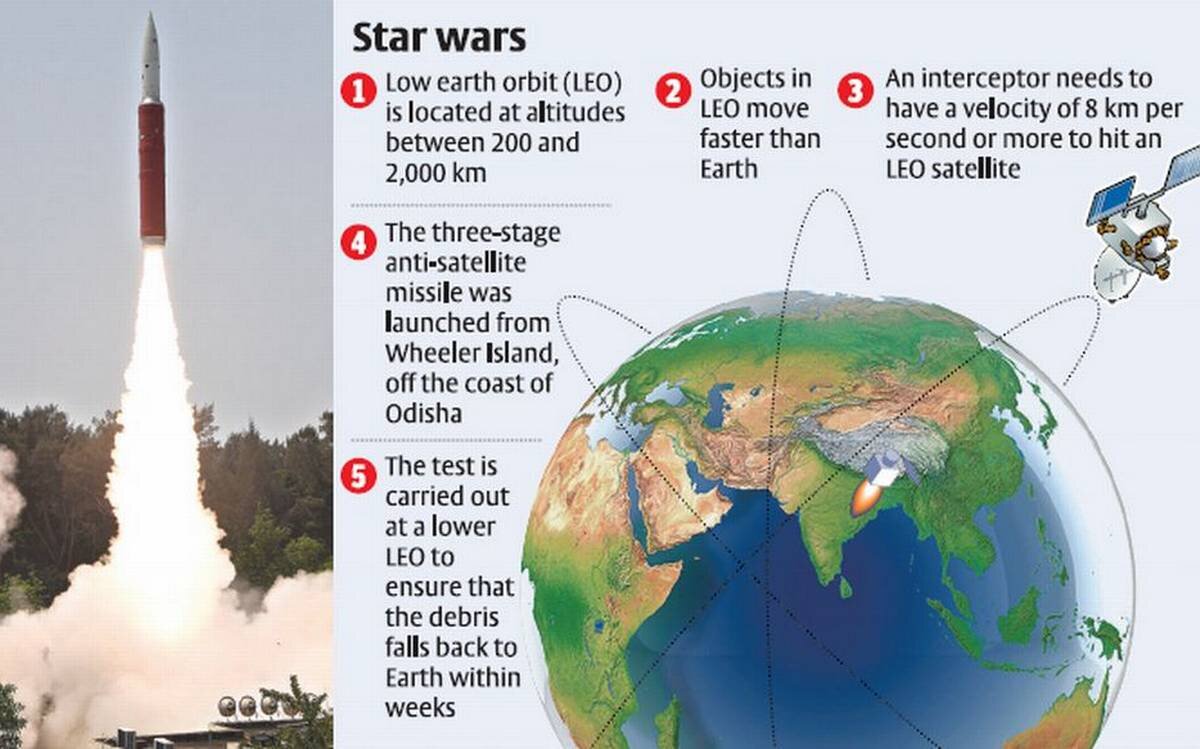Science & Technology
Mission Shakti
- 28 Mar 2019
- 4 min read
India has tested the Anti-Satellite System(A-SAT) from Dr A P J Abdul Kalam Island, formerly known as Wheeler Island, an island off the coast of Odisha.
- The test was named as Mission Shakti.
- It has successfully destroyed a live satellite in the Low Earth Orbit(an altitude of 300 km).
- With this test India is now in the league of three countries after the U.S., Russia, and China to have such technology.
Anti-satellite (ASAT) System
- It is missile-based system to attack moving satellites.
- It is of 2 kinds— based on launching from the ground or from planes.
- Defence Research and Development Organisation (DRDO) has -developed Anti-satellite (ASAT)completely indigenously.
Significance
- A large number of crucial applications are now satellite-based. These include navigation systems, communication networks, broadcasting, banking systems, stock markets, weather forecasting, disaster management, land and ocean mapping and monitoring tools, and military applications.
- Destroying a satellite would render these applications useless. It can cripple enemy infrastructure, and without causing any threat to human lives.
- It was aimed at strengthening the capability to safeguard space assets and India’s overall security.
International Reactions on ASAT Test
- China has said that it hopes that all countries would uphold peace and tranquillity in the outer-space.
- Pakistan has said that Space is the common heritage of mankind and every nation has the responsibility to avoid actions which can lead to the militarization of this arena.
- US has said that it will continue to pursue shared interests in space and scientific and technical cooperation with India, including collaboration on safety and security in space. However, it expressed concern over the issue of space debris.
- India’s Stand:
- Ministry of External Affairs has stated that India is against the weaponization of Outer Space and supports international efforts to reinforce the safety and security of space based assets.
- India has always maintained that space must be used only for peaceful purposes.
International treaties Regarding Outer Space
- UN Outer Space Treaty 1967: It prohibits only weapons of mass destruction in outer space, not ordinary weapons. India ratified it in 1982.
- UN Transparency and Confidence Building Measures(TCBMs)-It includes registering space objects with the UN register, pre-launch notifications etc. India is sharing these details with UN.
- Inter-Agency Space Debris Coordination Committee (IADC) is an international governmental forum for the worldwide coordination of activities related to the issues of man-made and natural debris in space.
- India participates in IADC-activities with regard to space debris management, undertaking SOPA (Space Object Proximity Awareness and COLA (Collision Avoidance) Analysis.
- India has supported UN resolution on No First Placement of Weapons on Outer Space.
Low Earth orbit
- A Low Earth Orbit is an Earth-centered orbit with an altitude of 2,000 km or less.
- Most of the manmade objects in space are in LEO.






